themissinglink
Senior Member
- Joined
- Jan 13, 2018
- Messages
- 1,505
- Reaction score
- 3,828

MBTA riders frustrated by broken escalators at Aquarium station
The escalators are broken in both directions at the Aquarium stop.

Time for one of you guys to step up! Kidding lol, you definitely need serious experience in the non-profit industrial complex to be considerd.Transit Matters has posted the job description for the Executive Director role.

Have to agree with this. Nsrl and electrification right now are treated as something that would be nice to have one day but in reality they are non negotiable must haves for the future competitiveness and success of the region. Right now we have no short term, medium term, or long term plan for how we are going to get from here to there. That needs to change. We dont need shovels in the ground, but there needs to be a plan for how were going to get there and what the funding sources are going to be. Nsrl, electrification, and dense development around transit is the 3 headed monster that would absolutely transform cost of living, mobility, productivity, connectedness, innovation, sustainability and so much more in the metro region. There is no other way. We either move forward or get left behind. Boston has had a good run for the last couple decades, but nothing is guaranteeing that it is going to continue on forever. We need to skate to where the puck is going to be, not where it was. If we stay reactive instead of proactive we will get left behind.The outgoing director of TransitMatters penned a valedictory op-ed for us, where he calls for a much more robust long-term plan for the T's future:

The MBTA Needs a Long-Term Vision – Or We’ll Pay the Price
Greater Boston is a region of big ideas. The MBTA, however, isn’t thinking big enough, and its leaders need the CRE industry’s help to expand their horizons.bankerandtradesman.com
FWIW, that wasn't really the attitude that GM Eng and Mike Muller (executive director of commuter rail) projected at yesterday's Greater Boston Chamber event about the future of commuter rail, even if prior administrations might not have approached the issue with any great urgency.Nsrl and electrification right now are treated as something that would be nice to have one day

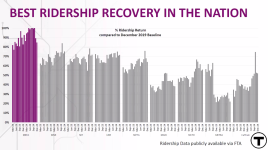
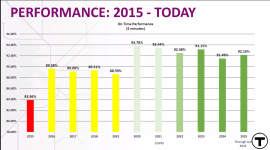
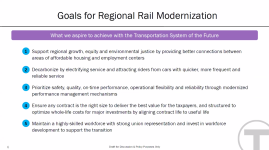
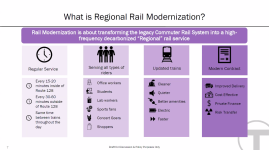
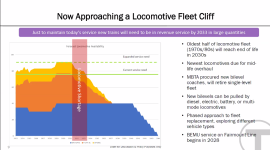
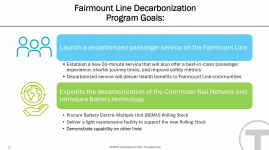
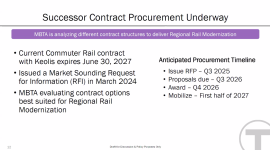
This is such a crock of shit it's not even funny. Total belief in magic beans when there's reams of data on the cost breakdowns showing this is not true.(under that scheme, Muller said, the T would take advantage of what he called "advances" in BEMUs and battery-electric locomotive tech to avoid having to undercut low bridges, string wire in tunnels or through politically sensitive areas like town centers or environmentally sensitive areas like wetlands)
They're not going to unpack it. I've heard Muller talk before. He's a complete and total kool-aid drinker on the magic of batteries to solve all the world's problems and get you out of jail free from having to string icky wires. They are not looking into these factual discrepancies at all. It's all warmed-over talking points, and that's all it will ever be from them.The even more puzzling / interesting question is wtf it would need to take 10-15 years and $30billion to do this right.
Whatever underlies those figures needs to be unpacked and elucidated.
Where the hell is that number pulled from? Firstly, 600 miles is not the length of the CR system, it's around 450. I have no idea how you get 600, that's way more than you could possibly have just in yards/depots. Maybe if you count each track as separate? That's more than a little disingenuous. Secondly, even if we take that 600 mile number at face value, and use the Caltrain Modernization program as our cost reference, which is absolutely insane and should not be the baseline since the project was generally mismanaged plus they got shafted on rolling stock costs, paying around 30% more compared to the MTA/LIRR for example, we still come out under $30 billion. (Not by much, it's around $27 billion, but still.) If we use the costs of the NE Corridor Electrification in 2000 as a baseline, we get $4.5 billion instead. Given the rolling stock procurement presumably the end result would be somewhere in the middle, I'd guess around $8-10 billion for the entire system.Full-system electrification, he said, would cost $30B +/-
Also, do animals particularly care about overhead lines? I feel like if anything the birds would be all for it.or environmentally sensitive areas like wetlands)
Also..."politically sensitive areas". In NIMBY-ese, that means: EVERYWHERE. And once you concede the town centers, it'll be everyone's backyard that becomes "politically sensitive". Then the places where nobody lives, because nature.Also, do animals particularly care about overhead lines? I feel like if anything the birds would be all for it.
I do think BEMUs will have a future, such as on short branches like Foxboro or maybe even whole lines like Greenbush, Kingston, or the Newburyport line north of Beverly where the frequencies are probably never going to be that high, maybe every 30 minutes max in most circumstances. Battery costs trend downwards, and so it seems likely that they either do or will make sense in some situations, just like DMUs can make sense over electrification today. But trying to extrapolate that out to the entire network is... reckless, to say the least.They want so so hard to believe that wires are completely optional.
Given that they say "388 route miles, 650 track miles", I assume that they are counting each track as separate. Which I don't think is actually that disingenous -- wire cost is 1:1 per track mile (at least just in terms of the physical wire itelf), the catenary "poles" also increase in size and material if they cover multiple tracks, and the underlying electrical demand also increases with parallel tracks, since you can run that many more trains.Where the hell is that number pulled from? Firstly, 600 miles is not the length of the CR system, it's around 450. I have no idea how you get 600, that's way more than you could possibly have just in yards/depots. Maybe if you count each track as separate? That's more than a little disingenuous. Secondly, even if we take that 600 mile number at face value, and use the Caltrain Modernization program as our cost reference, which is absolutely insane and should not be the baseline since the project was generally mismanaged plus they got shafted on rolling stock costs, paying around 30% more compared to the MTA/LIRR for example, we still come out under $30 billion. (Not by much, it's around $27 billion, but still.) If we use the costs of the NE Corridor Electrification in 2000 as a baseline, we get $4.5 billion instead.
I mean, I think there are pretty obvious drawbacks. It's not the overhead lines, it's the catenary poles every so many feet and the concrete used to hold them in place, and it's the disruption from construction, both in terms of the physical presence of equipment and in terms of the inevitable runoff.Also, do animals particularly care about overhead lines? I feel like if anything the birds would be all for it.
They may not care, but wetlands etc. carry additional levels of environmental permitting -- a salient issue in this home-rule state.Also, do animals particularly care about overhead lines? I feel like if anything the birds would be all for it.
Honestly, 30 minutes/4 TPH is plenty much service to amortize electrification costs. You practically need to breach above hourly service for it to be a good value, but :30 is more than fine and many agencies around the world have/can/do make valuations based on those service levels. Maybe the Fall River and New Bedford branches at hourly, and the Cape past Buzzards Bay at hourly (where :30 is likely overkill) could be omitted, but those are pretty much just bit remainders so I don't think you fragment fleets and ops just for remainders...you try to git 'R dun. Plus with 25 kV substations covering about 30 route miles apiece there's not really any branchlines you'd omit on cost. Everything north-of-Beverly can be one sub, and Franklin+Foxboro can share one sub (which would probably be located off the Framingham Secondary between Walpole and Foxboro anyway, because that's where the heavy-duty power lines cross the ROW).I do think BEMUs will have a future, such as on short branches like Foxboro or maybe even whole lines like Greenbush, Kingston, or the Newburyport line north of Beverly where the frequencies are probably never going to be that high, maybe every 30 minutes max in most circumstances. But trying to extrapolate that out to the entire network is... reckless, to say the least.
What in an OCS system touches wetlands? All of the hardware sits on the existing graded ROW. If they're able to continually service and upgrade the signal plant without onerous environmental permitting, they should be able to do the same with the electrical plant because it's all within the same trackbed envelope. The NEC Shoreline from New Haven to Boston runs a SIGNIFICANT percentage of its distance through wetlands, and it only took Amtrak 4 years to go from design-build contract signing to first electric trains running. They didn't get hung up on environmental regs, much less the politics of "home-rule" regs. This is a solved problem.They may not care, but wetlands etc. carry additional levels of environmental permitting -- a salient issue in this home-rule state.
Not really. For most out-in-the-open double-track OCS modern installations it's 1 pole overhanging both tracks, alternating sides of the ROW. Amtrak didn't significantly overbuild it when it did New Haven-Boston 25 years ago. There isn't a significant increase in catenary cost for double-track. And constant-tension catenary is a lot less visually intrusive with its structures than those giant old variable-tension towers you see across the New Haven Line and old Pennsy-instlall south-of-NYC NEC. You do need to have substations powered amply enough for 2 tracks, but they'd have to do that anyway for charging BEMU's saturating service on a DT corridor so ultimately the OCS is not bigly variable by track capacity.Given that they say "388 route miles, 650 track miles", I assume that they are counting each track as separate. Which I don't think is actually that disingenous -- wire cost is 1:1 per track mile (at least just in terms of the physical wire itelf), the catenary "poles" also increase in size and material if they cover multiple tracks, and the underlying electrical demand also increases with parallel tracks, since you can run that many more trains.
Caltrain electrification was a scandal it was so badly mismanaged. And you can't rely on that figure in a contextual vacuum because their whole "Modernization" project wadded up a lot of electrification-unrelated things into the project bucket, like grade crossing treatments and elimination and their disastrously scrapped custom PTC system. And they got absolutely fleeced on their vehicles because Stadler stuck Caltrain with all the financial risk for their invasive vehicle mods, and they took a complete bath on it (and still are, being on the hook for a bonkers $80M for a single 4-car BEMU demonstrator set for the Gilroy tail).I haven't checked your cost figures for Caltrain, but honestly that sounds like it's probably exactly how they came to their cost estimate (for better or worse). Particularly in a verbal presentation, and one where they are explaining why they are forgoing plans for systemwide electrification in the inital build, saying "$27B" would imply a higher level of precision than is actually accurate, so rounding to "$30B" is more accurate overall.
That all being said, yes, using Caltrain figures is debatable, and it seems like there is a lot of a priori thinking going on.
Did the NEC screech to a halt when Amtrak mass-erected 155 miles of cat supports over the course of 3-1/2 years? No. And they didn't impale themselves on environmental regs either despite much of the Shoreline in Connecticut being along waterfront estuaries and the straightaways in Massachusetts being heavily based on swamp embankments.I mean, I think there are pretty obvious drawbacks. It's not the overhead lines, it's the catenary poles every so many feet and the concrete used to hold them in place, and it's the disruption from construction, both in terms of the physical presence of equipment and in terms of the inevitable runoff.
This isn't a wild speculative question. Those 155 miles of NEC Shoreline were EIS'ed in the modern era. Caltrain was EIS'ed in the modern era. Denver FasTracks was EIS'ed in the modern era. Numerous LRT systems were EIS'ed through wetlands in the modern era. Hell, NJ Transit did some fresh electrification extensions on the North Jersey Coast Line as late as 1988. We have the datasets on how much environmental regs dinged up those projects. It's not an onerous burden. Yes, they'll have to site the off-ROW substations in places where the wetlands ain't. But there's a few linear miles of 'wobble' in where a sub can be sited and still power its designated 30-mile track section, so even that costly item does not incur onerous EIS'ing challenges. We've done this...recently...and extensively even in this country. It's not a "Thar be dragons!" unknown to concern-troll about, though I know that's exactly what they're doing here.Now, to be clear, I'm not saying it's a valid justification for not electrifying tracks through wetlands. Far from it: at this point, my heretical take is that we should radically de-emphasize EISs for mass transit projects. (Imagine debating whether to use water from a fire hose on particular corners of a burning house, since the water might damage priceless paintings inside. We must put out the fire, and so we must get people out of cars.)
But the potential impact on wetlands seems relatively easy to imagine; the answer isn't to deny that impact, but to acknowledge it and frame it against the harm of the no-build alternative.
